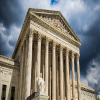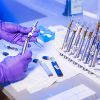Quarterly Journal 50-3
In This Section
 QJ 50.3 - Marijuana and Patents: The Complicated Relationship Between Patent Rights and the Federal Criminalization of Marijuana
QJ 50.3 - Marijuana and Patents: The Complicated Relationship Between Patent Rights and the Federal Criminalization of Marijuana
Reza Roghani Esfahani and Howard Bromberg
Despite being expressly protected by the U.S. Constitution, patent protection and enforcement for marijuana-related inventions is mired in many questions. These questions are a subset of the contradictions in the law of marijuana, where the federal government prohibits marijuana use and yet many of the states legalize, regulate, and tax it. In patent procurement context, these questions arise because of the interplay between marijuana prohibition as a Schedule I drug and the patentability requirements of the Patent Act. In patent enforcement context, these questions are the result of the federal judiciary’s responsibility to interpret and administer all federal laws—including the Controlled Substance Act, classifying marijuana as a Schedule I drug, and the Patent Act, demanding remedy for infringement of patents that necessarily advance illegal activity. This article examines the interface of some of the patentability requirements of the Patent Act with marijuana-related inventions. The article concludes that although marijuana-related inventions are likely patentable, criminalization of marijuana affects the quality of the granted patents. Further, this article identifies several issues that arise in enforcing a marijuana-related patent in federal court. These issues may include securing representation, dangers of self-incrimination, and identifying infringing parties. As a byproduct of these issues, this article concludes that the marijuana industry may be particularly vulnerable to frivolous lawsuits by Patent Assertion Entities.
 QJ 50.3 - Tragedy of the Commons: Why the Supreme Court’s Literal Application of “Product of Nature” Rule in AMP v. Myriad Genetics Necessitates a Legislative Change to 35 U.S.C. § 101
QJ 50.3 - Tragedy of the Commons: Why the Supreme Court’s Literal Application of “Product of Nature” Rule in AMP v. Myriad Genetics Necessitates a Legislative Change to 35 U.S.C. § 101
Henry Loznev
 QJ 50.3 - Not So Natural Phenomena: A Look at § 101’s Impact on Biotech Patents
QJ 50.3 - Not So Natural Phenomena: A Look at § 101’s Impact on Biotech Patents
Jordan M. Cowger
This note seeks to address the uncertainty surrounding patent eligibility for DNA and DNA-derivative pharmaceuticals. Inconsistent judicial decisions and lack of action by the Supreme Court make this issue ripe for resolution. Due to the importance of DNA-derivative pharmaceuticals—not just to precision medicine but also to the United States’ position as a life science leader in the global economy—Congress must take action now. Following Europe’s approach, Congress should adopt a revised version of the draft Tillis-Coons STRONGER Patents Act, which includes an additional subsection to section 101 specifically calling for patent protection for DNA-derivative inventions.
 QJ 50.3 - Technological Fault Lines: The Problems with Tailoring Patent Eligibility at the USPTO
QJ 50.3 - Technological Fault Lines: The Problems with Tailoring Patent Eligibility at the USPTO
Joshua A. Lopez
Many members of the patent community seek clarification of subject matter eligibility law, but administrative rulemaking would be a problematic approach. The Supreme Court has carved out what qualifies as a “process, machine, manufacture, or composition of matter” under 35 U.S.C. § 101 - Inventions patentable. Although the Court has dealt with this statute in decades past, it began in 2012 to reinvigorate the rule that “laws of nature, natural phenomena, and abstract ideas” are not patent eligible. Mayo, Myriad, and Alice mark the Court’s recent encounters with section 101. Respectively, these cases have heightened the patent standard for three major areas: diagnostic tools, genetics, and software. If Congress grants the USPTO rulemaking authority to clarify or enhance the eligibility standards, the agency’s rules would likely reflect a similar technological split. This is problematic because technological discrimination is prohibited under TRIPS Article 27, and divided USPTO rule makers could invite harmful divide-and-conquer influence. Legislators should work to make section 101 more fair and sensible, but they should delegate rulemaking authority with caution.
Upcoming Events
-
.png?sfvrsn=9aa26827_1) 2026 AIPLA Virtual Corporate Practice Institute
2026 AIPLA Virtual Corporate Practice Institute
January 13 to 20, 2026 | Up to 360 Minutes of CLE
The Corporate Practice Institute is not a bootcamp. This program provides in-depth insight for in-house corporate counsel and agents to learn about wide ranging legal issues affecting their practice from experienced practitioners. It is designed for experienced in-house attorneys and new in-house attorneys learning to manage new corporate environments and challenges not taught in law schools or private practice. The Institute also helps private practice attorneys, especially associates, prepare for potential in-house career moves. The program also provides valuable networking opportunities to connect with each other and learn from each other's experiences. This online, CLE-program spans two half-days, from Noon – 5:00 pm Eastern and includes 3 one-hour education sessions and a networking session each day. -
 AIPLA CLE Webinar: Regulation, Risk & Resilience: The Nexus Between Professional Liability, Duty of Competence & Practitioner Well-Being
AIPLA CLE Webinar: Regulation, Risk & Resilience: The Nexus Between Professional Liability, Duty of Competence & Practitioner Well-Being
February 10, 2026 12:30 PM to 2:00 PM | Eligible for up to 90 Mins CLE
Mental health issues and substance use disorders can affect any practitioner, in any setting, and at any time. Left untreated, they can destroy careers and lives. This program will discuss where the legal profession currently stands in relation to the substantial challenges presented by untreated mental health issues and substance use disorders and examine the nexus between ethical competence under the USPTO Rules of Professional Conduct and practitioner well-being. This program will educate attendees on how to recognize the signs of an impaired attorney, how to approach the colleague and begin a conversation, and discuss the possible disciplinary and professional liability implications of an impaired practitioner’s conduct. In addition, the speakers will present best practices/effective risk management strategies, preventative measures, and proposed policy and well-being initiatives, that practitioners in any practice setting may implement to protect clients, themselves, and other firm members as well as save careers. -
.png?sfvrsn=fb5905da_1) 2026 IP Transactions Bootcamp
2026 IP Transactions Bootcamp
February 12, 2026
This in-person bootcamp is designed to provide practical insights and strategies for professionals working in intellectual property transactions. The day features a comprehensive agenda including: Panels and CLE Sessions: Learn about Working with Tech Transfer Offices, Strategies for successful collaborations between nonprofits and industry, and Protecting and monetizing an AI asset. Drafting and Negotiating Tips: Get practical advice on drafting and negotiating strategic collaboration and license agreements. Hands-on Workshop: Participate in a Mock licensing negotiation to put your skills to the test. Networking: Conclude the day with a dedicated Networking reception. -
2026 Patent Prosecution Boot Camp - Arlington, VA
March 4 to 6, 2026 | Up to 1235 minutes, including 60 Ethics minutes
Registration coming soon! The 2026 Patent Prosecution Boot Camp is a comprehensive, CLE-accredited seminar that includes instructional lecture-style sessions with practical tips on U.S. and international patent preparation and prosecution, as well as hands-on interactive workshops that will walk you through drafting claims and responding to office actions. -
-(1).png?sfvrsn=7a1054_1) 2026 Trade Secret Summit
2026 Trade Secret Summit
March 26 to 27, 2026
The AIPLA Trade Secret Summit is the leading trade secret conference in the nation, with speakers from across the spectrum of private practitioners, in-house counsel, government, and academia, as well as fantastic networking opportunities. CLE credits will be available.

